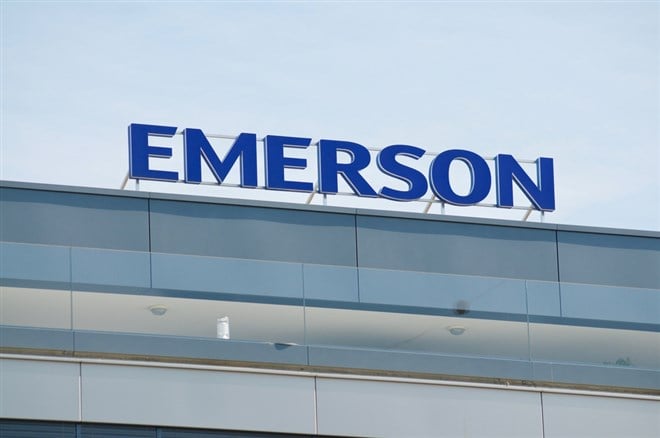Key Points
- Emerson Electric is a Dividend King with 65 years of dividend increases.
- The sell-side reveals a tightly held stock.
- Emerson Electric can offer value and yield to investors.

Emerson Electric Co. (NYSE: EMR) is a Dividend King with more than 65 years of consecutive annual dividend increases and the power to keep increasing its payout for decades to come.
First, what are Dividend King stocks? Dividend Kings have increased their payouts for at least 50 years. However, don't confuse the Dividend Kings with the Dividend Aristocrats.
What is a Dividend Aristocrat? Dividend Aristocrats are S&P 500 stocks that have increased their payouts for at least 25 years.
The biggest difference in the comparison between Dividend Kings vs Aristocrats is that Kings are not always Aristocrats but an Aristocrat with more than 50 years of increases, such as Emerson Electric, is always a Dividend King.
Emerson Electric Dividend Data
Emerson Electric got its start in 1890 in St. Louis, Missouri. The company was founded by John Wesley Emerson, a Civil War veteran who wanted to manufacture electric motors. The company soon expanded to other electric machines and a string of acquisitions. The World War II years led the company into military technology and another string of acquisitions led to an IPO in the 1960s. The company has paid a dividend every year since going public and increased it each year as well. A history of dividend increases attracts buy-and-hold investors and can help reduce volatility in the stock.
Emerson Electric Co. is one of the largest in the world and ranked 120 on the Fortune 500 list. The company is headquartered in Ferguson, Missouri, and operates in more than 170 manufacturing locations and relies on more than 86,700 employees. The stock is a component of the S&P 500 and S&P 100, which makes it an important component of stock indices and ETFs around the world. Key products include, but are not limited to, process control units, climate control units, power systems, automation equipment, electronic devices and tools.
Growth and IPO
Emerson Electric’s growth is one for the history books. The company is an example of being in the right place at the right time — electrification was just taking hold when it was founded. Emerson Electric is fundamental to the industry and so well-entrenched that it is considered “systemically important,” as they say in the banking world.
The company’s growth has slowed over the years but is still present to some degree via acquisitions, if nothing else.
Acquisitions and Investments
Over the years, Emerson Electric has reinvested large portions of its earnings into the business and acquired other companies. Emerson Electric has acquired nearly 80 other businesses, including RIDGID Tools and InSinkErator plumbing products. Emerson Electric should continue growing the value of its business.
Emerson Stock Dividend and EMR Dividend History
The Emerson stock dividend is a safe dividend for risk-averse investors. Its 65-year history of increases proves its reliability and confirms a positive outlook for future increases. The only negative in Emerson’s dividend history is its low 1.5% CAGR, which suggests future increases will be small as well. The silver lining is that small, manageable increases provide the key to the company’s history of increases and should not hold it against it.
Ratings: EMR
Let's take a look at how the dividend compares to competitors and how the institutions and analysts feel about it as well.
EMR Stock Dividend Information
EMR stock tends to yield around 2.4% but may fluctuate around this range along with market sentiment and valuation. For example, the stock was trading at a near 16x earnings multiple in late 2022 while it was yielding 2.4%. The yield had been as low as 2% in recent trading history and as high as 2.5%.
The takeaway is that EMR stock dividend yield has been running fairly steady as the share price increases in tandem with its payout. The company’s 40% payout ratio is another reason to love the stock and one that suggests it could continue to increase the payout for another 65 years. The added bonus is that regular dividend increases can help to offset the impact of inflation.
EMR’s dividend tends to run higher than the broad market but this may not always be true. When compared to its peers, the EMR dividend history is far superior and far more attractive. Emerson tends to run in between competitors like ABB Ltd. (NYSE: ABB) and Eaton Corp. PLC (NYSE: ETN) with the former on the higher side and the latter on the low side. ABB Ltd. has had a very spotty and unreliable dividend payment history. Eaton’s dividend is better but not as high quality as Emerson.
Put simply, Emerson is a King of Dividend Kings and one that may not even have industry peers for comparison.
Institutions and Analysts Own It
The sell-side, represented by the institutions and the analysts (who represent corporations and high-net-worth individuals), own this stock. The sentiment will increase to "buy" or "accumulate" during expansionary economic times and may fall back to a "hold'' during downturns but they always hold the stock.
Institutional ownership tends to run in the range of 70% to 75%, which is more than enough to help reduce volatility in the price action. Names on the list of analysts include Wells Fargo and Company (NYSE: WFC), Deutsche Bank (NYSE: DB), Oppenheimer Holdings Inc. (NYSE: OPY), Morgan Stanley (NYSE: MS) and Citigroup Inc. (NYSE: C).
EMR Dividend Growth CAGR
The Emerson Electric dividend growth compound annual growth rate (CAGR) is the average growth rate of a dividend distribution for a given period. Most stock websites give it a five-year CAGR or thereabouts, which is an important metric to know.
When choosing between two dividend growth stocks with otherwise equally attractive qualities, the one with the higher CAGR is the better buy. The higher the CAGR, the larger the dividend increases and the better the benefit to investors. However, a high CAGR may also indicate that the pace of distribution increases could slow. It's also a good idea to check the stock payout ratio (the amount of earnings paid as a dividend) and balance sheet health.
Dividend Capture Strategy for EMR
The dividend capture strategy is a trading strategy that attempts to buy dividend stocks, earn or “capture” the dividend, then sell them at no cost. To do this, investors buy the stock after the dividend is announced but before the ex-dividend date and then sell the stock on the ex-dividend day or soon after.
The ex-dividend date is the first day buyers of the stock will not get the upcoming dividend payment. If they buy on or after this day, they are only eligible for the next, yet-to-be-declared payment. Investors who want to capture the dividend will need to own it before this day and hold it until the ex-dividend day.
If the stock is sold for the same or a higher price, the dividend is “captured” at a 100% rate or greater, minus transaction costs (if any). If the stock is sold for a loss, the profit is the amount of the dividend minus the loss, which could be more than the dividend. The price of a dividend stock will often fall by the dividend amount or more on the day of record, so this can be a very tricky strategy to use successfully.
Consider targeting Emerson and other dividend stocks when they are in a price upswing because that offers the best odds of success.
Emerson Electric: A King of Dividend Kings
Emerson Electric is a high-quality stock with several attractive features in its favor. Not only is it a blue-chip player in the electric devices industry, but it offers value and a high yield as a well-established dividend growth stock. These features have helped it gather a high level of sell-side ownership and that helps to reduce volatility as well.
FAQs
Does Emerson Electric pay a dividend?
Emerson Electric does pay a dividend. The company is a Dividend King with more than 65 years of annual dividend increases. The Emerson dividend has a safe payout.
How often does Emerson Electric pay dividends?
Emerson Electric stock dividend pays out each quarter and is usually declared separately from its earnings report.
Is Emerson a good dividend stock?
Emerson is a good dividend stock for investors. The EMR dividend is safe, steady and reliable, which is what good income portfolios rely on. Investors who want to know how to build a large dividend stock portfolio should start by looking for stocks like this one.
Is Emerson a good stock to buy?
Emerson Electric is a good stock to buy but only for the right reasons and for the right portfolio. Investors looking for growth may be disappointed with their results, but investors looking for dividends and stability may like Emerson.
Get Income-Generating Stocks Like Emerson Electric in Your Inbox.
Stop riding the roller coaster of the stock market and sign-up to receive DividendStocks.com's daily ex-dividend stocks and dividend investing news for EMR and related companies.
Companies Mentioned in This Article:| Company | Current Price | Price Change | Dividend Yield | P/E Ratio | Consensus Rating | Consensus Price Target |
|---|
| Emerson Electric (EMR) | $138.80 | +0.3% | 1.52% | 33.21 | Moderate Buy | $139.44 |
| Citigroup (C) | $85.58 | -2.3% | 2.62% | 13.52 | Moderate Buy | $85.43 |
| Deutsche Bank Aktiengesellschaft (DB) | $29.40 | +1.7% | N/A | 17.50 | Moderate Buy | N/A |
| Eaton (ETN) | $357.17 | -0.4% | 1.16% | 36.04 | Moderate Buy | $369.74 |
| Morgan Stanley (MS) | $141.15 | -1.8% | 2.62% | 16.57 | Hold | $135.54 |
| Oppenheimer (OPY) | $66.42 | -1.5% | 1.08% | 9.88 | N/A | N/A |
| Wells Fargo & Company (WFC) | $81.67 | -0.8% | 1.96% | 14.66 | Moderate Buy | $78.33 |

About Thomas Hughes
Experience
Thomas Hughes has been a contributing writer for DividendStocks.com since 2019.
- Professional Background: Thomas Hughes is the Managing Partner of Passive Market Intelligence LLC, a market research platform he launched in 2023 with the mission: “We watch the market so you don't have to.” He has worked as a blogger, stock market commentator, and independent analyst since 2010 and has been actively involved in trading and investing since 2005.
- Credentials: He holds an Associate of Arts in Culinary Technology—training that honed his discipline, attention to detail, and ability to anticipate outcomes, all of which carry over into his work as a market analyst.
- Finance Experience: Thomas has been writing about finance and investing since 2011, when he discovered it could be more than a personal passion—it could be a profession. He’s been a contributing writer for DividendStocks.com since 2019.
- Writing Focus: He specializes in the S&P 500, small-cap stocks, dividend and high-yield strategies, consumer staples, retail, technology, oil, and cryptocurrencies. His analysis blends chart-based technical setups with key fundamental insights, helping readers identify actionable trends.
- Investment Approach: Thomas takes a hybrid approach that combines technical analysis with deep fundamental research. He often writes about macroeconomic shifts, earnings trends, and sentiment-based trading signals.
- Inspiration: Thomas first became interested in stocks after attending a seminar on how to buy and sell your own shares. That event opened his eyes to the market's potential and sparked a lifelong interest in investing.
- Fun Fact: Thomas took up model railroading by accident a few years ago—and now he can’t stop running the rails.
- Areas of Expertise: Technical and fundamental analysis, S&P 500, retail and consumer sectors, dividends, market trends
Education
Associate of Arts in Culinary Technology